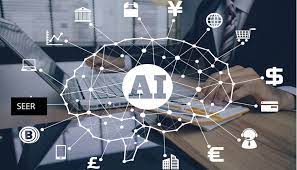The Benefits of AI in the Retail Industry: Revolutionizing Customer Experience and Operational Efficiency
Artificial Intelligence (AI) is revolutionizing the retail industry by enhancing customer experience and operational efficiency. With the rise of e-commerce and the increasing demand for personalized shopping experiences, AI is becoming a game-changer in the industry. In this article, we explore how AI is transforming the retail industry and the benefits it offers.
Enhancing Customer Experience
AI is transforming the way retailers interact with their customers, providing personalized shopping experiences and enhancing customer engagement. Retailers are leveraging AI to analyze customer data to create targeted marketing campaigns, offering customers personalized recommendations based on their browsing and purchase history. This not only enhances customer satisfaction but also increases the likelihood of customer loyalty and repeat business.
AI-powered chatbots are also changing the way retailers interact with their customers, providing instant support and resolving queries in real-time. Chatbots can handle customer inquiries round the clock, reducing the need for human customer support, thereby reducing costs and improving efficiency.
Additionally, AI is improving the in-store experience for customers through facial recognition technology. This technology allows retailers to identify and greet customers as soon as they enter the store, providing personalized recommendations and offers based on their purchase history. This creates a more personalized and engaging experience for customers, leading to increased sales and customer loyalty.

Operational Efficiency
AI is transforming the operational efficiency of retailers by automating various processes, reducing costs, and improving supply chain management. Retailers are leveraging AI to optimize inventory management, reducing the chances of overstocking or stockouts, and enabling retailers to fulfill customer orders in real-time.
AI is also being used to automate and streamline the order fulfilment process, from picking to packing and shipping, reducing the need for human intervention, thereby reducing errors and improving efficiency. This has led to faster delivery times and improved customer satisfaction, leading to increased sales and repeat business.
Additionally, AI is transforming supply chain management, enabling retailers to predict demand and plan production schedules more accurately. This reduces the risk of excess inventory or stockouts, reducing costs and improving profitability. AI-powered predictive analytics also enable retailers to optimize their pricing strategies, analyzing customer data to determine the optimal price points for their products and services.
Challenges and Limitations
While AI offers numerous benefits to the retail industry, there are also several challenges and limitations that need to be addressed. One of the major challenges is the cost of implementing AI technology. The cost of developing and implementing AI systems can be significant, especially for smaller retailers. Additionally, the maintenance and ongoing development of AI systems can also be costly.
Another challenge is the need for data privacy and security. Retailers need to ensure that customer data is stored securely and used ethically. There is also the risk of data breaches, which can lead to reputational damage and loss of customer trust.
Finally, there is the risk of AI bias, where AI algorithms can reflect the biases of their creators, leading to discriminatory outcomes. Retailers need to ensure that their AI systems are unbiased and free from any discriminatory outcomes.
Conclusion
AI is revolutionizing the retail industry by enhancing customer experience and improving operational efficiency. Retailers are leveraging AI to personalize the shopping experience for customers, providing targeted recommendations and instant support through chatbots. AI is also improving operational efficiency by automating various processes, reducing costs, and improving supply chain management.
While there are challenges and limitations to the implementation of AI in the retail industry, the benefits outweigh the costs. As the retail industry becomes increasingly competitive, AI is becoming a critical tool for retailers to stay ahead of the competition and meet the demands of their customers.
AI is transforming the retail industry, and retailers who embrace this technology are likely to reap significant benefits. By leveraging AI to enhance customer experience and improve operational efficiency, retailers can stay ahead of the curve and remain competitive in the rapidly evolving retail landscape. However, retailers need to address the challenges and limitations of AI implementation, such as cost, data privacy and security, and AI bias, to ensure that they are using this technology ethically and effectively.

As AI technology continues to evolve, we can expect further innovations in the retail industry. For example, AI-powered virtual assistants may become a common feature in retail stores, providing customers with personalized recommendations and assistance while they shop. Similarly, AI-powered robots may be used to automate various tasks, such as inventory management, stocktaking, and even customer service.
The benefits of AI in the retail industry are clear, and it is likely that we will see continued growth in the use of AI technology by retailers. With AI, retailers can create a more engaging and personalized shopping experience for customers, while also improving operational efficiency and reducing costs. However, it is important that retailers address the challenges and limitations of AI implementation to ensure that they are using this technology ethically and effectively.
AI is transforming the retail industry, and retailers who embrace this technology are likely to reap significant benefits. By leveraging AI to enhance customer experience and improve operational efficiency, retailers can stay ahead of the curve and remain competitive in the rapidly evolving retail landscape. However, retailers need to address the challenges and limitations of AI implementation, such as cost, data privacy and security, and AI bias, to ensure that they are using this technology ethically and effectively.
As retailers continue to explore the possibilities of AI, it is important that they also consider the impact on their workforce. While AI can automate many tasks and improve operational efficiency, it may also lead to job displacement for some workers. Retailers need to plan for the future of work and invest in upskilling and reskilling programs to ensure that their workforce is equipped with the skills necessary to thrive in a rapidly changing industry.
Furthermore, as the use of AI becomes more widespread in the retail industry, it is important to ensure that ethical considerations are at the forefront of decision-making. Retailers must consider the impact of AI on their customers, employees, and the wider society. This includes ensuring that AI systems are transparent and explainable, and that they do not perpetuate discrimination or biases.
















